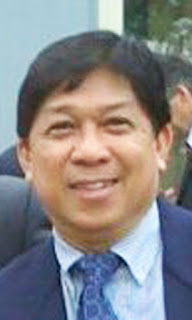By ALFREDO P HERNANDEZ
“GET your focus.”
 | ||||
| Eddie Tarog ... 'project focus' |
Eddie Tarog, an executive at a management consultancy firm in Jakarta, Indonesia, told the JPNHS members involved in project planning “to decide on one single project, but do it in a big way”.
A member of Batch 66, Tarog pitched the idea after being informed of a number of projects being lined up by the association to be taken up at the general alumni homecoming on April 28-29, 2012.
He made known his impression in an email sent to his batch mates as his response to suggestions from association members who are based overseas.
A copy of this email was sent to MWBuzz.
Tarog said the planning group led by Sam Tatom, who is also the secretary of the LaPIMa group, should be able “to short list the many suggested projects and then decide on one project”.
He was reacting to a list of proposed projects that included Tesda scholarships, livelihood projects like piglet dispersal, fish-cage project, the development of a fish marketing scheme similar to that one operating in Mercedes, cooperative, among others.
Tarog has implied that the association could be stretching itself too much, thus becoming less effective in carrying out all it wanted to accomplish.
He said: “Every single one of those suggested ideas will require focus, resources, manpower, expertise to implement … and I'm not sure the group can do justice to all of them.”
Urging them to focus on one single project, Taro said the chances of doing it well and doing it in a big way is “much greater”.
He said: “I have seen so many good ventures fall by the wayside because of lack of focus. Just making one venture succeed will already demand much work and resources. Let's make a big success of one project first, then others can follow.”
Noting that education has been a top project, Tarog said the group should go all out in supporting its education program.
He was referring to the association’s plan to send scholars for skills training at Tesda (Technology Education and Skills Development Authority), which would require substantial funding, hoped to raise from the members and through fundraising drives.
Tarog said that while a scholarship program is no not a new idea, what can be new is the unprecedented scale of the program the group can do this time around.
He asked: “Why help only 10 scholars? Let's help 100, or 1,000!
“Obviously, we still have to do the math and iron out the details of a big scholarship program, but if we are to embark on an ambitious venture to help our town, I say we focus on education … but do it in a really big way because the effects and benefits of education are incalculably far reaching and self sustaining.”
He said that impact of education on the life of an individual cannot be overstated.
“We don't have to look very far for proofs ... WE are all proofs of what education can do! And imagine the multiplier effect : one person we help educate would affect the lives of his family and the people around him.
“And if we help 10, 100, 1,000, imagine how much good that will do for the community!”
Tarog said that if the association would opt for a livelihood program, it should choose one and focus on making it succeed.
“A livelihood program is essentially a business venture, and every business venture would require careful planning, a dedicated organization, technical and business expertise.”
Not only that, he said. “It would also require considerable resources upfront to cover development and implementation costs, working capital and the likelihood of losses during the initial stages of operation.”
It would also demand extreme patience "as many variables will come into play, most of which are beyond the group’s control, such as competition, local politics, vested interests, weather disturbances, accidents, labor problems, market forces and financial instabilities," Tarog said.

No comments:
Post a Comment